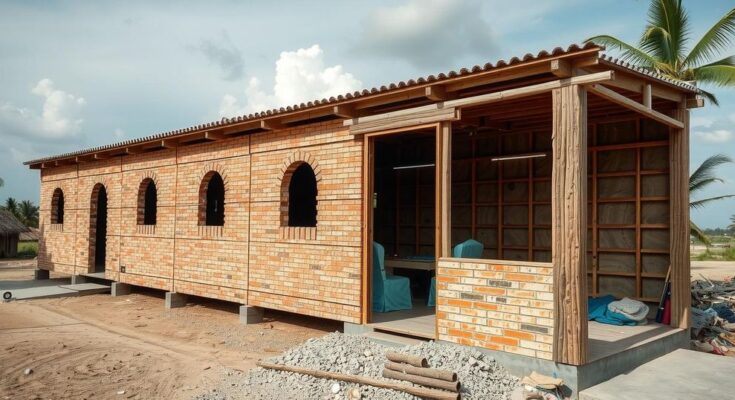Mozambique has begun building shelters for Cyclone Chido victims, prioritizing resilient materials due to the storm’s severe impact, which resulted in numerous deaths and injuries. Critical infrastructure has been damaged, and humanitarian efforts are ongoing to assist the affected population. Concerns about a cholera outbreak worsening have arisen in light of the cyclone’s devastation.
Mozambique has commenced the construction of shelters for individuals impacted by Cyclone Chido, which struck the nation’s northern regions on Sunday, resulting in at least 70 fatalities and 600 injuries. During a visit to the affected areas, Trade and Industry Minister Silvino Moreno emphasized the government’s commitment to providing assistance to the victims and acknowledged the contributions from international partners.
Moreno highlighted the urgent need for resilient housing, stating that previous shelters, primarily built with mud and reeds, were inadequate against the cyclone’s ferocity. He advocated for enhanced training in construction techniques to ensure sturdier buildings are established for future resilience. The cyclone had caused widespread devastation in Mayotte prior to reaching Mozambique, leading to increased risks for vulnerable populations such as refugees and asylum-seekers.
In southern Malawi, the cyclone also inflicted damage through powerful winds and rains, exacerbating the situation across the region. Mozambique’s meteorological agency warned of further storms anticipated during the ongoing rainy season, underlining the necessity for improved preparedness. Reports indicate that UNICEF deems approximately 174,000 individuals impacted, a number expected to rise as assessments continue.
The impact of the cyclone was further pronounced in the education and health sectors, with reports of significant damage to classrooms and health facilities. Mike Chimedza, UNICEF’s field office head in Zambezia province, stated that the agency has allocated resources for an immediate response to benefit 50,000 people and has initiated local training for disaster response. Furthermore, the cyclone’s destruction has left over 25,000 families without electricity and has significantly damaged critical infrastructure.
In light of a pre-existing choleral outbreak in the region, aid agencies have raised concerns regarding the potential for the situation to deteriorate further, making immediate action imperative.
Cyclone Chido recently wreaked havoc across northern Mozambique, exacerbating challenges faced by the government and humanitarian organizations in addressing the needs of affected populations. In the wake of the cyclone, the government has prioritized the construction of durable shelters to minimize future losses from similar natural disasters. The cyclone’s impact has reached beyond Mozambique, affecting neighboring regions such as southern Malawi and Mayotte, complicating the response efforts for already vulnerable communities. As the rainy season progresses, both the meteorological agency and international organizations stress the urgency of preparedness plans to mitigate humanitarian crises.
The commencement of shelter construction in Mozambique following Cyclone Chido represents a proactive response amidst a concerning humanitarian situation. With reports of widespread damage and a significant number of individuals affected, the emphasis on building resilient structures and providing adequate training is essential for future preparedness. The cyclone’s effects, coupled with the ongoing cholera outbreak, highlight the urgent need for comprehensive disaster management strategies. Continued international support and local training initiatives will be crucial in addressing the immediate and long-term needs of the affected populations.
Original Source: www.voanews.com




